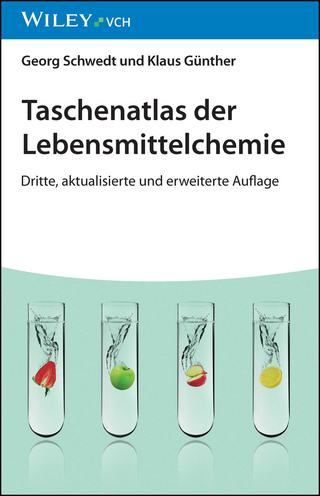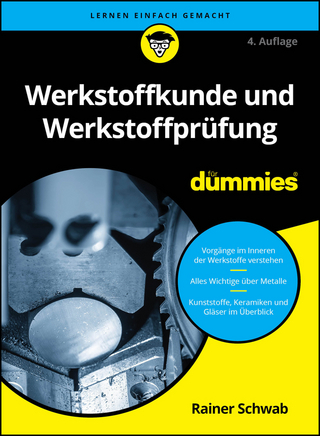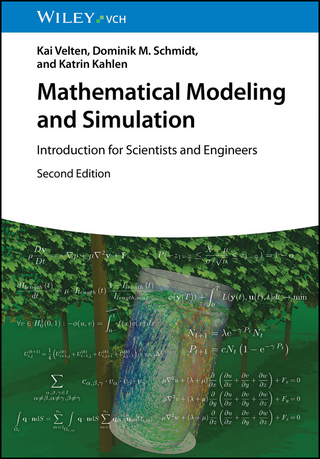
Innovative and Emerging Technologies for Textile Dyeing and Finishing
Wiley-Scrivener (Verlag)
978-1-119-71014-1 (ISBN)
- Titel z.Zt. nicht lieferbar
- Versandkostenfrei innerhalb Deutschlands
- Auch auf Rechnung
- Verfügbarkeit in der Filiale vor Ort prüfen
- Artikel merken
This aspect forced western countries to exploit their high technical skills in the advancements of textile materials for high quality technical performances, and development of cleaner production technologies for cost effective and value-added textile materials. Therefore, vast and effective research investigations have been undertaken all over the world to minimize the negative environmental impact of synthetic chemical agents through the sustainable harvest of eco-friendly bioresource materials.
The book will discuss following research developments in academic and industry:
Improvement in dye extraction and its applications
Impact of textile dyeing on environment
Textile finishing by natural and ecofriendly means
Natural dyes as environmental-friendly bioresource products
Textile effluent remediation via physical, chemical and biological processes.
Preface xv
1 Eco-Friendly Stimuli and Their Impact on the Tinctorial Capacity of Textile Materials 1
Vasilica Popescu and Luminita Ciobanu
1.1 Introduction 2
1.2 Characterization of Ultrasound Physical Stimuli 2
1.2.1 Ultrasonic Equipment 3
1.2.2 Effects of Ultrasound in Liquid Mediums 4
1.2.3 Types of Ultrasound Cavitation 6
1.2.4 The Action of Ultrasound on Polymers 7
1.2.5 Applications of Ultrasound in Textile Finishing 8
1.2.5.1 Ultrasound-Assisted Washing of Textile Materials 9
1.2.5.2 Ultrasound-Assisted Pre-Treatments (Scouring, Bleaching) 9
1.2.5.3 Ultrasound as Physical Stimulus for Textile Dyeing 11
1.2.5.4 Ultrasound-Assisted Extraction and Dyeing Using Natural Dyes 11
1.2.5.5 Ultrasound-Assisted Dyeing Using Synthetic Dyes 13
1.2.5.6 Ultrasound-Assisted Aftertreatments 25
1.2.5.7 Advantages and Disadvantages of Ultrasound 25
1.3 Microwave as Stimulus for the Textile Wet Processes 26
1.3.1 Characterization of Microwaves 26
1.3.2 Applications of Microwaves 26
1.3.3 Microwave Ovens 27
1.3.3.1 Working Principle of the Microwave Oven 27
1.3.4 Microwaves Working Principle for Wet Processes in the Textile Industry 28
1.3.5 Factors and Analyses that Highlight the Effects of Microwaves on Textile Wet Processes 29
1.3.6 Eco-Friendly Microwave-Assisted Dyeing Process of Acrylic Knitted Fabrics 30
1.3.6.1 Characterization of the Stages of the Eco-Friendly Microwave-Assisted Process 31
1.3.6.2 Modifications of Acrylic Fibers under the Action of Microwaves 33
1.4 Conclusions 38
References 39
2 Skincare Finishes to Textiles 45
Angela Danila and Laura Chirila
2.1 Introduction 45
2.2 Types of Skincare Textiles 48
2.2.1 Textiles with UV Protection Properties 48
2.2.2 Textiles With Antimicrobial Properties 50
2.2.3 Textiles with Anti-Cellulite Properties 51
2.2.4 Textiles with Antioxidant Properties 52
2.2.5 Textiles With Anti-Aging Properties 54
2.2.6 Textiles With Moisturizing Properties 55
2.2.7 Textiles With Flavoring Properties 57
2.2.8 Textiles With Refreshing and Relaxing Properties 73
2.3 Techniques for Skincare Compounds Embedding 74
2.4 Techniques for Microparticles Applying on Textile Supports 76
2.5 Conclusion 79
References 79
3 Recent Advances in Synthetic Dyes 91
Suhail Ayoub Khan, Daud Hussain and Tabrez Alam Khan
3.1 Introduction 91
3.2 Synthetic Dyes in Textile Coloration 92
3.3 Synthetic Dyes in Dye-Sensitized Solar Cells 99
3.4 Synthetic Dyes in Liquid Crystal Display 102
3.5 Synthetic Dyes in Fluorescent Sensors 105
3.6 Synthetic Dyes in the Detection of G-Quadruplex DNA 106
3.7 Conclusion 107
References 107
4 Natural Dye Extraction and Dyeing of Different Fibers: A Review 113
Bota, Sanda and Indrie, Liliana
4.1 Introduction 114
4.2 Classification of Natural Dyes 116
4.2.1 Sources of Natural Dye 117
4.2.2 Classification According to Method of Application 117
4.2.3 Based in Chemical Structure 118
4.3 Color-Based Classification 122
4.4 Dyeing With Natural Color From Calendula offcinalis 124
4.5 Extraction of Natural Dyes 125
4.6 Dyeing Methods 127
4.6.1 Mordanting Methods 127
4.6.2 Dyeing Methods 130
4.7 Conclusions 131
References 131
5 Airflow, Foam, and Supercritical Carbon Dioxide Dyeing Technologies 137
Molla Tadesse Abate and Melkie Getnet Tadesse
5.1 Introduction 137
5.2 Airflow Dyeing Technology 138
5.2.1 Airflow Dyeing Process 140
5.2.2 Airflow Dyeing Steps 140
5.2.3 Airflow Dyeing Machines 141
5.2.4 Advantages of Airflow Dyeing 143
5.3 Foam Dyeing Technology 145
5.3.1 Principle of Foam Dyeing 146
5.3.2 Foam and Properties 146
5.3.3 Foam Processing Steps 147
5.3.4 Foam Dyeing of Textiles 149
5.3.5 Advantages of Foam Dyeing Technology 151
5.4 Supercritical Carbon Dioxide Dyeing Technology 152
5.4.1 Physicochemical Properties of scCO2 153
5.4.2 The Supercritical CO2 Dyeing Process 154
5.4.3 Mechanism of Dyeing in scCO2—A Focus on Polyester 156
5.4.4 Supercritical CO2 Dyeing of Other Synthetic Fibers 157
5.4.5 Supercritical CO2 Dyeing of Natural Fibers 158
5.4.6 Advantages of scCO2 Dyeing Technology 158
5.5 Conclusion 159
References 160
6 Colored Nanofiber Production: A Literature Review and Case Study 165
Derman Vatansever Bayramol, Rıza Atav, Ahmet Özgür Ağırgan and Aylin Yıldız
6.1 Introduction 166
6.2 Electrospinning 170
6.2.1 Historical Background 170
6.2.2 Solution Electrospinning 172
6.2.3 Melt Electrospinning 173
6.3 Colored Nanofiber Production 175
6.4 A Case Study: Silver Cyclohexane Mono Carboxylate: β-Cyclodextrine Inclusion Complex Doped Colored Functional Poly(Vinyl Alcohol) Nanoweb Production 177
6.4.1 Introduction 177
6.4.2 Material and Methods 179
6.4.3 Results and Discussions 180
6.4.3.1 Results Related to the Production of Ag-CC:β-CD Doped PVA Nanofibers 180
6.4.3.2 Results Related to the Production of Ag-CC:β-CD Doped Colored PVA Nanofibers 183
6.5 Conclusion 184
Acknowledgements 185
References 185
7 The Effect of Plasma Treatment on Dyeing of Natural Fibers 191
Maryam Naebe, Abu Naser Md Ahsanul Haque and Aminoddin Haji
7.1 Introduction 191
7.2 Types of Plasma 192
7.3 Plasma Application on Natural Fibers 194
7.3.1 Cotton 194
7.3.2 Wool 200
7.3.3 Other Natural Fibers 204
7.4 Environmental Impact 206
7.5 Conclusions 207
References 208
8 The Effect of Plasma Treatment on Dyeing of Synthetic Fibers 213
Aminoddin Haji, Abu Naser Md Ahsanul Haque and Maryam Naebe
8.1 Introduction 213
8.2 Mechanism of Plasma Interaction With the Substrate 215
8.3 Achievable Functionalities by Plasma Application 217
8.3.1 Wettability 217
8.3.2 Dyeing and Printability 217
8.3.3 Desizing 217
8.3.4 Cleaning and Sterilization 218
8.3.5 Adhesion Enhancement 218
8.3.6 Hydrophobicity 218
8.3.7 Other Finishing Effects 218
8.4 Application on Synthetic Fibers 219
8.4.1 Polyester 219
8.4.2 Nylon 223
8.4.3 Polypropylene 225
8.4.4 Acrylic 227
8.5 The Current Standpoint of Plasma Application 227
8.6 Conclusions 228
References 228
9 Ozone-Based Finishing of Textile Materials 235
M. İbrahim Bahtiyari and Ayşegül Körlü
9.1 Introduction 235
9.1.1 Solutions that can be Applied for Sustainable and Environmentally Friendly Production 237
9.2 Application of Ozone in Textile Finishing 239
9.2.1 General Approach to Ozone Gas 239
9.2.1.1 Physical and Chemical Features of Ozone 240
9.2.1.2 Generation of the Ozone Gas 242
9.2.2 Applications—Usages of Ozone Gas 243
9.2.2.1 Ozone Applications in Pretreatment of Textile Materials 244
9.2.2.2 Ozone Applications in Coloration of Textile Materials 251
9.3 Conclusion with Future Expectation 257
References 258
10 Ultrasound-Based Wet Processes in Textile Industry 265
Ayşegül Körlü and M. İbrahim Bahtiyari
10.1 Introduction 265
10.2 Application of Ultrasound in Textile Finishing 267
10.2.1 Ultrasonic Pretreatment of Textile Materials 271
10.2.1.1 Pretreatment of Cellulosic Fibers With the Help of Ultrasound 272
10.2.1.2 Pretreatment of Protein-Based Fibers With the Help of Ultrasound 275
10.2.1.3 Pretreatment of Synthetic Fibers With the Help of Ultrasound 276
10.2.2 Ultrasonic Coloration of Textile Materials 277
10.2.2.1 Ultrasound in Coloration of Cellulosic Fibers 278
10.2.2.2 Ultrasound in Coloration of Protein-Based Fibers 280
10.2.2.3 Ultrasound in Coloration of Synthetic Fibers 281
10.2.3 Ultrasonic Finishing of Textile Materials 283
10.2.3.1 Ultrasound in Finishing of Cellulosic Fibers 284
10.2.3.2 Ultrasound in Finishing of Protein-Based Fibers 286
10.2.3.3 Ultrasound in Finishing of Synthetic Fibers 287
10.3 Conclusion With Future Expectation 289
References 290
11 Synthetic and Natural UV Protective Agents for Textile Finishing 301
Anuradha Sankaran, Arpana Kamboj, Lata Samant and Seiko Jose
11.1 Introduction 302
11.2 Role of Textiles in Protective Clothing 303
11.3 Factors Influencing Ultraviolet Radiation 305
11.3.1 Ozone 305
11.3.2 Cloud Cover 305
11.3.3 Air Quality 306
11.3.4 Altitude 306
11.3.5 Latitude 306
11.3.6 Surface Reflection 306
11.3.7 Water Depth 307
11.4 Susceptibility of Various Textiles on UV Radiations 307
11.5 Method of Analysis and Standard 308
11.5.1 Global Solar UV Index (UVI) 309
11.5.2 Australian/New Zealand Standard AS/NZS 4399-2017 310
11.6 Synthetic Organic Compounds for UV Protection of Textiles 310
11.7 Ultraviolet Protection of Textiles From Natural Dyes 314
11.8 Nanotechnological Interventions in UV Protective Textiles 315
11.8.1 UV Protection of Nano-ZnO on Textiles 315
11.8.2 UV Protection of Nano-TiO2 on Textiles 316
11.8.3 UV Protection of Nanosilver on Textiles 317
11.9 Graphene as UV Blocker for Textiles 317
11.10 Conclusion 319
References 319
12 Hydrophobic and Oleophobic Finishes for Textiles 325
Laura Chirila and Angela Danila
12.1 Introduction 326
12.2 Textiles With Special Wettability Properties 328
12.2.1 Surface Wetting Theories 328
12.2.2 Liquid Repellent Coating Design Factors 331
12.2.2.1 Surface Chemistry 332
12.2.3 Surface Roughness 332
12.3 Liquid Repellent Treatments of Textile Materials 332
12.3.1 Coatings Based on C8 Fluorinated for Super/Hydrophobic and Super/Oleophobic Treatments of Textile Materials 334
12.3.2 Sustainable Super/Hydrophobic and Super/Oleophobic Treatments for Textiles 334
12.3.2.1 Coatings Based on ≤C6 Fluorinated for Super/Hydrophobic and Super/Oleophobic Treatments of Textile Materials 337
12.3.2.2 Coatings Based on Non-Fluorinated for Super/Hydrophobic and Super/Oleophobic Treatments of Textile Materials 346
12.4 Characterization Methods of Repellency Degree 361
12.4.1 Contact Angle Measurement 361
12.4.2 Standardized Tests 362
12.5 Properties Desired of Liquid-Repellent Coatings 363
12.6 Environmental Impact 363
12.7 Conclusions 365
References 367
13 Flame Retardant Finish for Textile Fibers 373
Nur-Us-Shafa Mazumder and Mohammad Tajul Islam
13.1 Introduction 373
13.2 Importance of Flame Retardant Finish 374
13.3 Factors Affecting the Flammability of Textiles 375
13.3.1 Fabric Construction 375
13.3.2 Textile Fibers 376
13.3.3 Types of Polymer 376
13.4 Mechanism of Combustion of Textile Fibers 377
13.5 Flame Retardants 378
13.5.1 Mode of Action 379
13.5.1.1 Gas-Phase Mode 379
13.5.1.2 Condensed-Phase Mode 379
13.5.1.3 Other Mode 380
13.5.2 Flame Retardant Chemicals 380
13.5.2.1 Halogen-Based Flame Retardants 381
13.5.2.2 Phosphorus-Based Flame Retardants 381
13.5.2.3 Nitrogen-Based Flame Retardants 383
13.5.2.4 Silicon-Based Flame Retardants 384
13.5.2.5 Nanocomposites 384
13.6 Flame Retardant Finish for Different Polymers 386
13.6.1 Flame Retardant Finish for Cellulosic Polymer 386
13.6.1.1 Non-Durable Flame Retardant Finish for Cellulosic Polymer 387
13.6.1.2 Durable Flame Retardant Finish for Cellulosic Polymer 388
13.6.2 Flame Retardant Finish for Protein Polymer 391
13.6.3 Flame Retardant Finish for Synthetic Polymer 392
13.7 Different Flame Retardant Techniques 394
13.7.1 Intumescent Flame Retardant Techniques 394
13.7.2 Layer-by-Layer Flame Retardant Techniques 394
13.7.3 Sol–Gel Flame Retardant Techniques 395
13.8 Assessment of Flame Retardancy 396
13.9 Application of Flame Retardant Textiles 396
13.10 Environmental Issues and Sustainable Flame Retardants 400
References 401
Index 407
| Erscheinungsdatum | 09.03.2021 |
|---|---|
| Sprache | englisch |
| Maße | 10 x 10 mm |
| Gewicht | 454 g |
| Themenwelt | Naturwissenschaften ► Chemie |
| Technik ► Maschinenbau | |
| ISBN-10 | 1-119-71014-6 / 1119710146 |
| ISBN-13 | 978-1-119-71014-1 / 9781119710141 |
| Zustand | Neuware |
| Haben Sie eine Frage zum Produkt? |
aus dem Bereich


